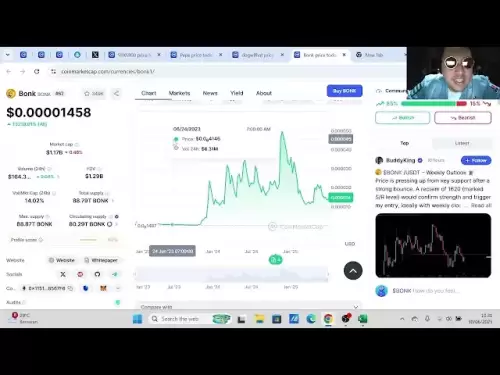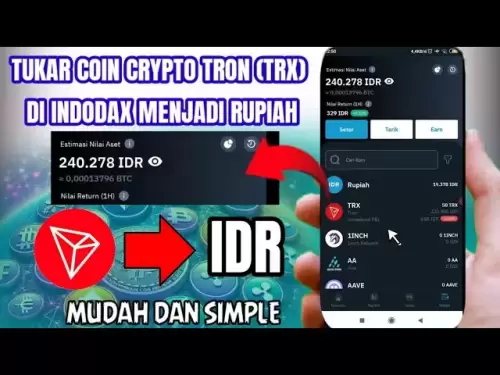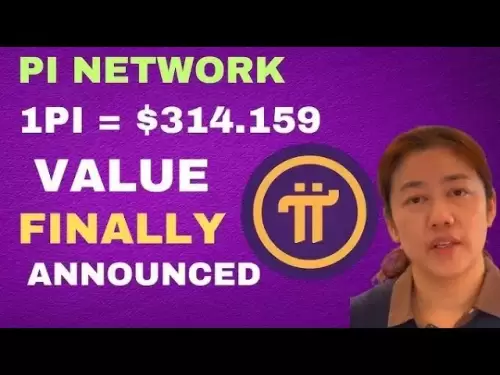-
 Bitcoin
Bitcoin $107,397.3430
-0.20% -
 Ethereum
Ethereum $2,467.5633
1.33% -
 Tether USDt
Tether USDt $1.0002
0.01% -
 XRP
XRP $2.1994
0.71% -
 BNB
BNB $655.8723
1.07% -
 Solana
Solana $157.3780
4.63% -
 USDC
USDC $1.0000
0.02% -
 TRON
TRON $0.2792
1.23% -
 Dogecoin
Dogecoin $0.1645
0.50% -
 Cardano
Cardano $0.5666
1.83% -
 Hyperliquid
Hyperliquid $39.8730
3.91% -
 Bitcoin Cash
Bitcoin Cash $514.7673
5.02% -
 Sui
Sui $2.7969
-0.51% -
 Chainlink
Chainlink $13.2880
0.07% -
 UNUS SED LEO
UNUS SED LEO $9.1148
-0.60% -
 Avalanche
Avalanche $17.9247
0.34% -
 Stellar
Stellar $0.2351
-0.98% -
 Toncoin
Toncoin $2.9456
2.69% -
 Shiba Inu
Shiba Inu $0.0...01144
-0.74% -
 Litecoin
Litecoin $85.9064
-0.62% -
 Hedera
Hedera $0.1495
1.47% -
 Monero
Monero $319.0339
3.82% -
 Polkadot
Polkadot $3.3940
-0.40% -
 Dai
Dai $1.0000
0.01% -
 Ethena USDe
Ethena USDe $1.0003
0.00% -
 Bitget Token
Bitget Token $4.5223
-1.95% -
 Uniswap
Uniswap $7.1384
-0.02% -
 Aave
Aave $272.7534
0.72% -
 Pepe
Pepe $0.0...09836
2.57% -
 Pi
Pi $0.5107
-2.06%
Why is the transaction speed of Exodus wallet slow?
Exodus wallet's transaction speed can be affected by blockchain tech, network congestion, fees, transaction size, and user settings; optimizing these can improve performance.
Apr 04, 2025 at 09:56 pm
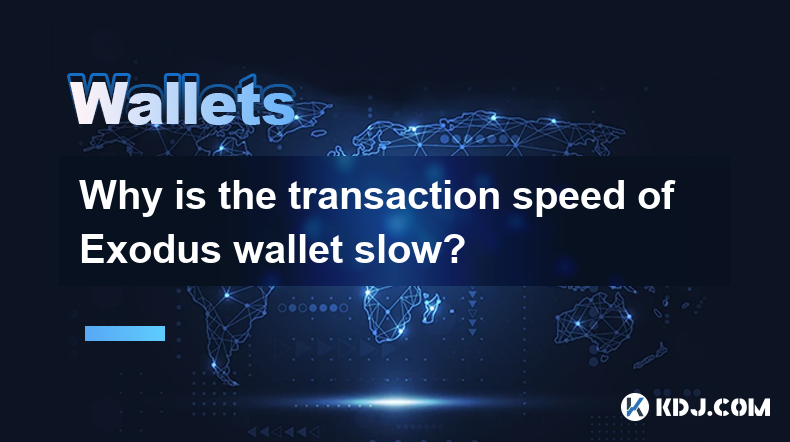
The transaction speed of the Exodus wallet can be influenced by several factors, which are important to understand for users looking to optimize their experience. One primary reason for slow transaction speeds is the underlying blockchain technology that Exodus wallet interacts with. Different cryptocurrencies have varying block times and network congestion levels, which directly impact transaction processing times. For instance, Bitcoin transactions can take longer due to its 10-minute block time and high demand, whereas other cryptocurrencies like Litecoin or Ethereum might process transactions faster due to shorter block times and less congestion.
Another factor affecting transaction speed is the wallet's user interface and backend processes. Exodus wallet, being a multi-currency wallet, needs to handle transactions across different blockchains, which can introduce delays. The wallet's software must communicate with various nodes and APIs to broadcast transactions, and any inefficiencies in these processes can slow down the overall transaction speed. Additionally, the wallet's security measures, such as multi-signature requirements or additional verification steps, can also contribute to slower transaction times.
Network congestion plays a significant role in transaction speed. When a blockchain network is experiencing high traffic, transactions can take longer to be confirmed. This is particularly true for popular cryptocurrencies like Bitcoin and Ethereum, where the demand for transaction processing can exceed the network's capacity. During peak times, users might experience delays as their transactions wait in the mempool to be included in a block. Exodus wallet users can monitor network congestion through various online tools and adjust their transaction fees accordingly to prioritize their transactions.
Transaction fees are another critical aspect that can influence the speed of transactions in the Exodus wallet. Higher fees can incentivize miners to include transactions in the next available block, thus speeding up the process. Conversely, setting lower fees might result in longer wait times as miners prioritize transactions with higher fees. Exodus wallet allows users to adjust their transaction fees, providing flexibility to balance between cost and speed. Understanding how to set appropriate fees based on current network conditions can significantly improve transaction speeds.
The size and complexity of the transaction can also affect its processing time. Larger transactions, such as those involving multiple inputs or outputs, require more data to be processed and verified by the network. This can lead to longer confirmation times, especially on networks with limited block sizes. Additionally, transactions that involve smart contracts or other complex operations on blockchains like Ethereum can take longer to process due to the additional computational requirements.
Factors Affecting Transaction Speed in Exodus Wallet
- Blockchain Technology: Different cryptocurrencies have varying block times and network congestion levels, impacting transaction speeds.
- Wallet Interface and Backend Processes: Handling transactions across multiple blockchains can introduce delays.
- Network Congestion: High traffic on blockchain networks can cause delays in transaction confirmation.
- Transaction Fees: Higher fees can prioritize transactions, while lower fees may result in longer wait times.
- Transaction Size and Complexity: Larger or more complex transactions require more processing time.
Exodus wallet's design as a non-custodial wallet also impacts transaction speed. Non-custodial wallets require users to manage their private keys and sign transactions locally, which can add a layer of complexity and potential delay. While this enhances security and user control, it can slow down the transaction process compared to custodial wallets, where transactions are managed by a third party. Users should weigh the benefits of security against the potential for slower transaction speeds when choosing a wallet.
The geographical location of the user can also influence transaction speed. If a user is located far from the nodes or servers that Exodus wallet uses to broadcast transactions, there might be additional latency in the communication process. This is particularly relevant for users in regions with less developed internet infrastructure. To mitigate this, users can consider using a VPN or selecting a wallet server closer to their location to potentially improve transaction speeds.
Exodus wallet's integration with third-party services can also affect transaction speed. For instance, if the wallet relies on external APIs for price data or transaction verification, any delays or issues with these services can impact the overall transaction process. Users should be aware of these dependencies and consider the reliability of the services that Exodus wallet integrates with when evaluating transaction speeds.
User behavior and settings within the Exodus wallet can also play a role in transaction speed. For example, users who frequently switch between different cryptocurrencies or manage multiple wallets within Exodus might experience slower transaction times due to the additional processing required. Additionally, settings such as automatic backups or synchronization with other devices can introduce delays. Users can optimize their experience by minimizing unnecessary operations and ensuring their settings are configured for optimal performance.
Tips to Improve Transaction Speed in Exodus Wallet
- Adjust Transaction Fees: Set higher fees during peak times to prioritize transactions.
- Monitor Network Congestion: Use online tools to check network conditions and plan transactions accordingly.
- Optimize Wallet Settings: Minimize unnecessary operations and ensure settings are configured for performance.
- Use a VPN: Consider using a VPN to reduce latency if located far from wallet servers.
- Choose Less Congested Networks: Opt for cryptocurrencies with faster block times and less congestion when possible.
The type of transaction being conducted can also impact speed. For instance, simple transfers between wallets might be processed faster than more complex operations like staking or participating in decentralized finance (DeFi) protocols. Users should be aware of the specific requirements and potential delays associated with different types of transactions within the Exodus wallet.
Exodus wallet's support for multiple cryptocurrencies means that users might experience varying transaction speeds depending on the specific cryptocurrency they are using. For example, transactions involving Bitcoin might be slower due to its widespread use and high demand, while transactions with less popular cryptocurrencies might be processed more quickly. Users should consider the characteristics of each cryptocurrency when planning their transactions and managing expectations regarding speed.
The wallet's software version and updates can also influence transaction speed. Older versions of the wallet might have bugs or inefficiencies that slow down transaction processing. Regularly updating the wallet to the latest version can help ensure that users benefit from the most recent improvements and optimizations. Additionally, new features or enhancements in wallet software can sometimes introduce temporary delays as users and the system adjust to the changes.
Exodus wallet's user interface and user experience design can also impact transaction speed. A well-designed interface can streamline the transaction process, making it easier for users to input necessary information and complete transactions quickly. Conversely, a cluttered or confusing interface might lead to user errors or delays in transaction submission. Users should familiarize themselves with the wallet's interface and take advantage of any available tutorials or guides to optimize their transaction experience.
Common Questions Related to Transaction Speed in Exodus Wallet
Q: Why are my Bitcoin transactions slower in Exodus wallet compared to other cryptocurrencies?
A: Bitcoin transactions can be slower due to its 10-minute block time and high network congestion. Other cryptocurrencies like Litecoin or Ethereum might have shorter block times and less congestion, leading to faster transaction processing.
Q: Can adjusting transaction fees in Exodus wallet improve transaction speed?
A: Yes, setting higher transaction fees can incentivize miners to include your transaction in the next available block, thus speeding up the process. During peak times, higher fees can help prioritize your transaction.
Q: Does the size of the transaction affect its speed in Exodus wallet?
A: Yes, larger transactions with multiple inputs or outputs require more data to be processed, which can lead to longer confirmation times. Complex transactions involving smart contracts can also take longer due to additional computational requirements.
Q: How can I monitor network congestion to plan my transactions better?
A: You can use online tools like blockchain explorers or network status websites to check the current congestion levels of different blockchains. Planning your transactions during less congested times can help improve speed.
Q: Does the geographical location of the user impact transaction speed in Exodus wallet?
A: Yes, if you are located far from the nodes or servers that Exodus wallet uses, there might be additional latency. Using a VPN or selecting a server closer to your location can potentially improve transaction speeds.
Q: Can the version of the Exodus wallet software affect transaction speed?
A: Yes, older versions might have bugs or inefficiencies that slow down transactions. Regularly updating to the latest version can help ensure you benefit from the most recent improvements and optimizations.
Q: How does the type of transaction impact speed in Exodus wallet?
A: Simple transfers between wallets might be processed faster than more complex operations like staking or participating in DeFi protocols. The specific requirements and potential delays associated with different types of transactions should be considered.
Q: Does Exodus wallet's support for multiple cryptocurrencies affect transaction speed?
A: Yes, different cryptocurrencies have varying block times and network congestion levels. Transactions involving Bitcoin might be slower due to its high demand, while less popular cryptocurrencies might be processed more quickly.
Q: Can user behavior and settings within Exodus wallet impact transaction speed?
A: Yes, frequently switching between cryptocurrencies or managing multiple wallets can slow down transactions. Optimizing settings and minimizing unnecessary operations can help improve transaction speeds.
Q: How can the user interface of Exodus wallet affect transaction speed?
A: A well-designed interface can streamline the transaction process, making it easier and quicker to complete transactions. A cluttered or confusing interface might lead to user errors or delays in transaction submission.
Disclaimer:info@kdj.com
The information provided is not trading advice. kdj.com does not assume any responsibility for any investments made based on the information provided in this article. Cryptocurrencies are highly volatile and it is highly recommended that you invest with caution after thorough research!
If you believe that the content used on this website infringes your copyright, please contact us immediately (info@kdj.com) and we will delete it promptly.
- Unlock Crypto Riches: Mining Platforms & Starter Bonuses - Your Gateway to Digital Gold!
- 2025-06-30 22:30:11
- Dogecoin, Cloud Mining, and Risk Alerts: Navigating the Meme Minefield
- 2025-06-30 22:30:11
- Ric Edelman's Bold Crypto Allocation: A Financial Advisor's Perspective
- 2025-06-30 22:50:12
- Bitcoin Layer-2 Presale Heats Up: Is HYPER the Next Big Thing?
- 2025-06-30 22:50:12
- Bitcoin's Bull Run: Network Activity Tells a Different Story
- 2025-06-30 22:55:12
- SpacePay, Altcoins & Investing in 2025: What's the Buzz?
- 2025-06-30 23:10:12
Related knowledge
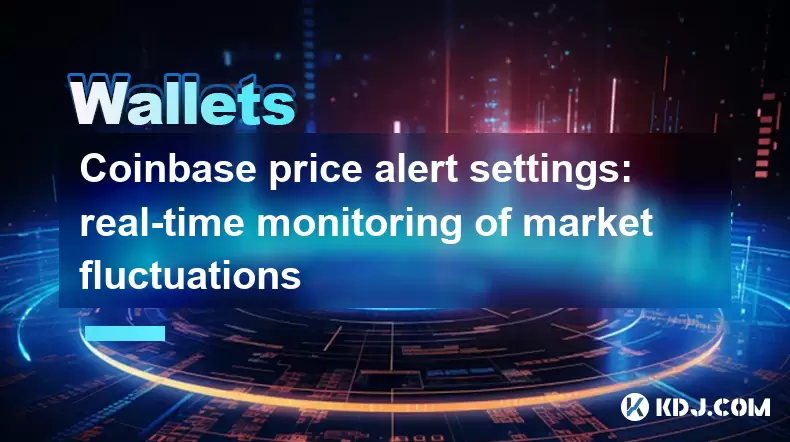
Coinbase price alert settings: real-time monitoring of market fluctuations
Jun 29,2025 at 07:00am
Setting Up Coinbase Price AlertsTo begin real-time monitoring of market fluctuations on Coinbase, users can utilize the built-in price alert feature. This function allows you to receive notifications when a cryptocurrency reaches a specific price point. To access this setting, open the Coinbase app or log in via the web platform. Navigate to the 'Prices...

How to stake cryptocurrencies on Coinbase? Benefits and risks
Jun 27,2025 at 06:36pm
Understanding Cryptocurrency Staking on CoinbaseStaking cryptocurrencies involves locking up digital assets to support the operations of a blockchain network, typically in return for rewards. Coinbase, one of the most popular cryptocurrency exchanges globally, offers staking services for several proof-of-stake (PoS) coins. Users can stake their holdings...
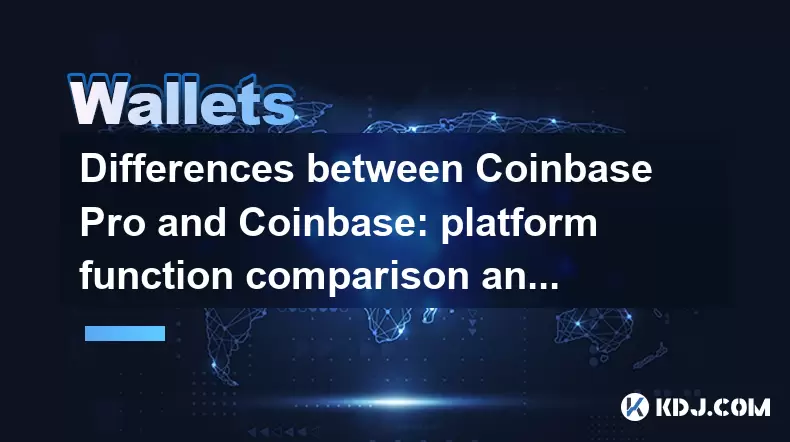
Differences between Coinbase Pro and Coinbase: platform function comparison and analysis
Jun 29,2025 at 08:21am
Overview of Coinbase and Coinbase ProWhen exploring the cryptocurrency trading landscape, users often encounter two platforms under the same parent company: Coinbase and Coinbase Pro. While both are operated by the same organization, they cater to different types of users and offer varying features. Coinbase is primarily designed for beginners and casua...
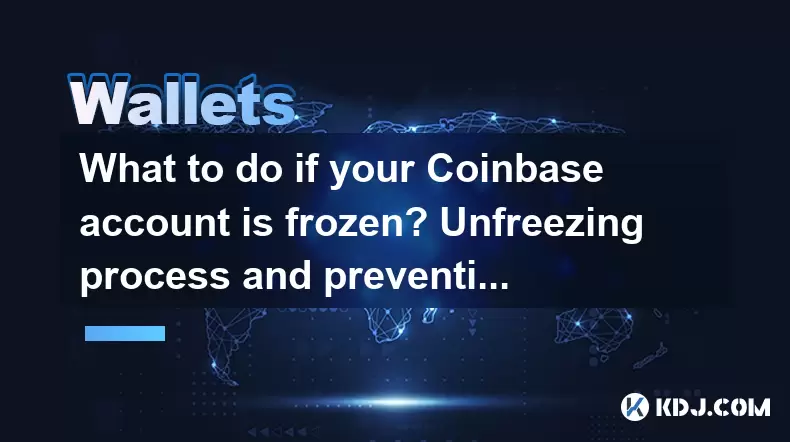
What to do if your Coinbase account is frozen? Unfreezing process and preventive measures
Jun 30,2025 at 03:49am
Understanding Why Your Coinbase Account Might Be FrozenIf your Coinbase account is frozen, it typically indicates that the platform has detected suspicious activity or potential violations of its terms of service. This could be due to a variety of reasons such as unusual login attempts, high-risk transactions, or incomplete verification steps. Coinbase ...

How to contact Coinbase customer service? Support channels and response times
Jun 28,2025 at 01:29pm
Contacting Coinbase Customer Service: Support Channels and Response TimesIf you're a user of Coinbase, reaching their customer service team may become necessary for various reasons, such as account verification issues, transaction disputes, or technical difficulties. Understanding the different support channels available and what to expect in terms of r...

Coinbase advanced trading function usage tutorial: limit orders and market orders
Jun 28,2025 at 09:07pm
Understanding the Difference Between Limit Orders and Market OrdersWhen using Coinbase's advanced trading features, it is crucial to understand the fundamental difference between limit orders and market orders. A market order executes immediately at the best available price on the market. This type of order ensures that your trade goes through quickly, ...

Coinbase price alert settings: real-time monitoring of market fluctuations
Jun 29,2025 at 07:00am
Setting Up Coinbase Price AlertsTo begin real-time monitoring of market fluctuations on Coinbase, users can utilize the built-in price alert feature. This function allows you to receive notifications when a cryptocurrency reaches a specific price point. To access this setting, open the Coinbase app or log in via the web platform. Navigate to the 'Prices...

How to stake cryptocurrencies on Coinbase? Benefits and risks
Jun 27,2025 at 06:36pm
Understanding Cryptocurrency Staking on CoinbaseStaking cryptocurrencies involves locking up digital assets to support the operations of a blockchain network, typically in return for rewards. Coinbase, one of the most popular cryptocurrency exchanges globally, offers staking services for several proof-of-stake (PoS) coins. Users can stake their holdings...

Differences between Coinbase Pro and Coinbase: platform function comparison and analysis
Jun 29,2025 at 08:21am
Overview of Coinbase and Coinbase ProWhen exploring the cryptocurrency trading landscape, users often encounter two platforms under the same parent company: Coinbase and Coinbase Pro. While both are operated by the same organization, they cater to different types of users and offer varying features. Coinbase is primarily designed for beginners and casua...

What to do if your Coinbase account is frozen? Unfreezing process and preventive measures
Jun 30,2025 at 03:49am
Understanding Why Your Coinbase Account Might Be FrozenIf your Coinbase account is frozen, it typically indicates that the platform has detected suspicious activity or potential violations of its terms of service. This could be due to a variety of reasons such as unusual login attempts, high-risk transactions, or incomplete verification steps. Coinbase ...

How to contact Coinbase customer service? Support channels and response times
Jun 28,2025 at 01:29pm
Contacting Coinbase Customer Service: Support Channels and Response TimesIf you're a user of Coinbase, reaching their customer service team may become necessary for various reasons, such as account verification issues, transaction disputes, or technical difficulties. Understanding the different support channels available and what to expect in terms of r...

Coinbase advanced trading function usage tutorial: limit orders and market orders
Jun 28,2025 at 09:07pm
Understanding the Difference Between Limit Orders and Market OrdersWhen using Coinbase's advanced trading features, it is crucial to understand the fundamental difference between limit orders and market orders. A market order executes immediately at the best available price on the market. This type of order ensures that your trade goes through quickly, ...
See all articles























